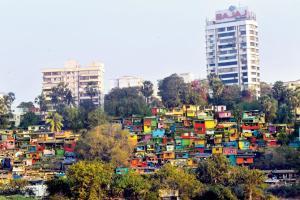High Court's order that only ground floor slum dwellers to be considered for housing benefits is something the government should have ensured long ago, say experts

Multi-storeyed slums, like this one in Bandra, can be found all over the city. Pic/Atul Kamble
Real estate experts, while appreciating a recent Bombay High Court order against regularising vertical slums, have expressed their concern about the seriousness of the state government in making the city slum free.
ADVERTISEMENT
Housing activist Ramesh Prabhu said, "Only those hutments/slums on the ground can be considered as slums. But, over a period of time, these slums started growing vertically and every occupant started using their ration cards, electricity bill, etc, to avail of benefits under the housing schemes. The court's decision is the right one."
He added, "Had the government taken corrective action to prevent such vertical constructions, the situation would have been different today. Instead, the ruling government resorted to vote bank politics and made announcements about regularising slums prior to 1995, then 2000 and recently in December 2017, the state assembly passed a proposal to regularise slums till 2011. And, now, under the Pradhan Mantri Awas Yojana, a new set of promises are being made."
Prabhu added, "With these promises came the assurances of space under redevelopment which went up from 180 sq feet to 225 sq feet to 269 sq feet and now the promise is 320 sq feet. These are carrots dangled before slum dwellers. From 1995 to 2018 (for 23 years) the state government [from different political parties] failed to develop even 10 per cent of the slums under rehabilitation schemes."
Justifying his claim about this being a false promise, Prabhu said, "The state government itself has stated that 16 per cent of the land area of Mumbai is covered by slums which accommodate 50 per cent of the city population. And, if 50 per cent of this goes for redevelopment, which works out to 8 per cent, do you think it is feasible to provide 320 sq feet tenements to each slum dweller on the balance 8 per cent of land? It is impossible."
Senior lawyer Vinod Sampat, who has been vocal about slum redevelopment issues, said, "'Such multi-storeyed slums come up only because SRA and BMC authorities, responsible for curbing illegal constructions, are hand-in-glove with slumlords. There have been numerous instances where SRA officials in connivance with builders have got exposed, where non-slumdwellers and developers' relatives were shown as occupants of hutments to avail of benefits under the schemes."
He added, "The slums will not be eliminated from Mumbai in the next 50 years, as, even today, encroachers are taking over public footpaths, pavements and even electric poles and still no action is initiated."
Sanjay Chaturvedi, a real estate lawyer, agreed, and said, "The city has already reached a saturation level, with no infrastructure in place, and the migrating population that continues to come to the city in search of a livelihood will only add to the struggle for space. The BDD redevelopment project, wherein nine towers will be constructed using 4 crore of saleable FSI, will only put an additional burden on the already burdened basic civic amenities."
Prabhu said the solution could be to allow small hutments/slums to have their own society formed and registered, with a condition that they cannot allow anymore encroachments in their area. And, the society should be formed within the three to six months. This will allow people's participation in keeping a check on illegal encroachers.
Vinod Sampat has a different view. He believes that employment opportunities should be created outside city limits, and closer to residential areas, which will, by default, develop areas that are at present not being properly utilised. This will help decongest Mumbai.
Latest Circular
The circular issued by the CEO, SRA, August 2, 2018 (copy with this paper), states that the government's ease of doing business aims to simplify the process of building approval and remove bottlenecks for faster development. This is also in line with the Pradhan Mantri Awas Yojana's target of creating a large housing pool and housing for all by 2022.
Under ease of doing business, self-certification has been found to be acceptable for acquiring various permissions and reduce the number of steps involved. Also, the various NOCs involved in the S R Schemes should be taken from qualified consultants as done by the BMC in its Ease of Doing Business Manual. The owner/developer shall appoint qualified consultants for technical guidance and design of the various aspects of the Slum Rehabilitation Scheme, as per the given format. Also in place of consultant, the owner/developer can appoint an institution like IIT, VJTI, SP College of Engineering.
Catch up on all the latest Mumbai news, crime news, current affairs, and also a complete guide on Mumbai from food to things to do and events across the city here. Also download the new mid-day Android and iOS apps to get latest updates
 Subscribe today by clicking the link and stay updated with the latest news!" Click here!
Subscribe today by clicking the link and stay updated with the latest news!" Click here!






